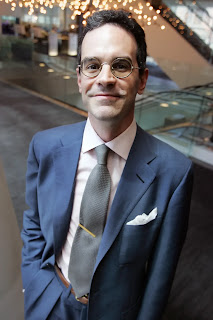Both of my grandfathers fought in the Second World War, entering combat in 1944 and staying in Europe throughout the duration of the War in Europe and its aftermath. Both resided from small towns in lakes area, rural Minnesota. My maternal grandfather fought in the 94th Infantry Division, and my paternal grandfather fought in the 10th Armored Division. Both belonged to General George S. Patton's Third Army, the same Third Army that exists to this day and my unit was under nearly six and a half decades later. One grandfather told many stories of the War, but his eyes closed about nine months before mine opened, so those stories have traveled through my father. And the grandfather I did know well never told stories of the War to his family, except to his two grandsons (myself included) who fought in the Global War on Terror era. There are many stories I could tell that have traveled through my father to me about Ernest M. Olson, Combat Command B (CCB), 10th Armored Division.
This story is a Christmas story because it represented the low point in the war for him.
The brilliant "Band of Brothers" has since made the Battle and Siege at Bastogne the entry point for the War in Europe for many in my generation. The focus of that show is Easy Company of the 101st Airborne. There is a brief mention of a Lt. George Rice, 10th Armored, who warns Cpt. Richard Winters that the German Panzer Division has cut the roads south, "looks like you boys are going to be surrounded." Cpt. Winters responded: "we're paratroopers, we're supposed to be surrounded." The episode ends with the elements of the 101st Airborne marching into the woods in the Belgian town of Bastogne to hold the line. The phrase hold the line itself has become synonymous in American military and now political dialogue. A place where you cannot surrender from. It is fight or annihilation. Life, or death. I clung to that brief appearance from the 10th Armored in that show because I knew that was my grandfather's unit, and I knew from stories that throughout the Siege of Bastogne, my grandfather was dug in and surrounded. The 101st Airborne has gotten the glory for decades, but elements of the 10th Armored, specifically his Combat Command B, were also present. And reading between the lines of that scene they would have been there even before the 101st Airborne arrived. It wasn't just that show. Press accounts at the time have always overlooked the contributions of the other units. But the reality is, as Antony Beevor's international bestseller Ardennes 1944 explains, the 10th Armored was one of two formations that the commanding General Dwight D. Eisenhower ordered to the Ardennes that first evening in December, a handful of days before Christmas. Combat Command B of the 10th Armored and its commander Col. William L. Roberts, had a "better idea of how desperate the situation was."
It was the largest German offensive of the western front burst out of the Ardennes forest on December 16, 1944, aiming to drive a wedge between British and American forces and to capture the Belgian port of Antwerp, vital to the German need to re-supply. Combat Command B was the first major combat unit to defend Bastogne arriving on December 18th, one week before Christmas.
My grandfather described this, as did just about anyone present, as the hardest and lowest days of the War for him. They were poorly supplied and without winter clothing, and the hospital overrun within days. The absolute low point came on Christmas Day my father was told, where Pfc. Olson sat down with his Christmas dinner, one of the few meals per year in military life that are going to be a step up from the usual. He took maybe a bite or two out of it before an exploded German artillery shell and its blasted dirt and snow from the Earth took it away from his hands and ruined it. As I'm sure many family histories could tell, and one of many reasons the "Band of Brothers" show first released just after 9/11, resonated so well with all who saw it and have these stories. The promise to God that Richard Winters made in the show that if he managed to get home again he would find a quiet piece of land somewhere, and spend the rest of his life in peace, is the same promise my grandfather made on Christmas Day, 1944 -- 80 years ago today. My grandfather would live another 40 years after that promise, raising four children with his wife Marie who he married just before leaving for Europe. An avid hunter like many Minnesota men, he didn't like the cold during hunting season as he got older, and my father, the youngest, recalled that they never spent a night away from home. They'd drive back from wherever they were the same night. A promise made, a promise kept.
The press called those surrounded and shelled in those days the "battered bastards of Bastogne." But the actions of the 10th Armored Division's Combat Command B have always been overlooked in comparison to the famous 101st Airborne and General Patton's drive to rescue the encircled American troops who faced total annihilation.
Of course, they are all heroes to me. And I am sure the Christmas Day story of my grandfather was made by many soldiers that day and in the days and weeks surrounding it.
For those reading, a Merry Christmas to you and your family and a Happy New Year.
*Republished from A Republic, We Will Restore It by permission of the author.
Troy M. Olson is an Army Veteran, lawyer by training, and co-author (with Gavin Wax) of ‘The Emerging Populist Majority’ now available at Amazon, Barnes and Noble, and Target. He is the Sergeant-at-Arms of the New York Young Republican Club and co-founder of the Veterans Caucus. He lives in New York City with his wife and son, and is the 3rd Vice Commander (“Americanism” pillar) of the first new American Legion Post in the city in years, Post 917. You can follow him on X/Twitter and Substack at @TroyMOlson
























.png)





.jpg)


